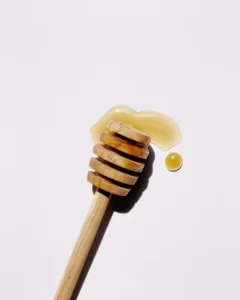Table of Contents
Introduction
In recent years, the popularity and demand for Manuka honey has skyrocketed. This unique type of honey, produced in New Zealand from the nectar of the Manuka tree, is praised for its numerous health benefits and healing properties.
However, a recent study conducted by the Unique Manuka Factor Honey Association (UMFHA) has raised concerns about the authenticity of some Manuka honey products on the market. The study tested 41 different brands of non-New Zealand sourced Manuka honey and found that all of them failed to meet the New Zealand Government Manuka honey identification test.
What is Manuka Honey?
Manuka honey is a special type of honey that is produced in New Zealand from the nectar of the Manuka tree. The Manuka tree, also known as Leptospermum scoparium, is native to New Zealand and produces a unique type of honey with exceptional medicinal properties.
Manuka honey is known for its antibacterial, antiviral, and anti-inflammatory properties, making it a popular choice for treating a wide range of health conditions. It is often used to treat wounds, soothe sore throats, improve digestion, and boost the immune system.
The Importance of Authenticity
The UMFHA study found that all 41 brands of non-New Zealand sourced Manuka honey failed to meet the New Zealand Government Manuka honey identification test. This means that these products are not authentic Manuka honey and may not possess the same health benefits as genuine New Zealand Manuka honey.
The UMFHA has expressed concerns that consumers may be misled into buying these imitation honeys under the impression that they have the same potential health benefits as genuine New Zealand Manuka honey.
To ensure that you are purchasing genuine New Zealand Manuka honey, it is important to look for the UMF trademark on the label. This trademark indicates that the product has passed the stringent quality, grading, and rating tests conducted by the UMFHA.
The Manuka Honey Testing Process
The UMFHA used a certified independent lab to conduct the testing of the 41 brands of non-New Zealand sourced Manuka honey. The lab applied a strict framework of identifying markers to determine whether the honeys were authentic Manuka honey.
The tests carried out by the lab proved that none of the honey samples were produced from nectar sourced from New Zealand’s native Manuka tree. This means that these products do not meet the criteria to be classified as genuine New Zealand Manuka honey.
Implications for Consumers, Distributors, and Retailers
The UMFHA’s findings have significant implications for consumers, distributors, and retailers. With all 41 brands of non-New Zealand sourced Manuka honey being found to be non-authentic, it is clear that these products are misleading consumers by passing themselves off as authentic Manuka honey.
Consumers who purchase these imitation honeys may not be receiving the same health benefits as they would from genuine New Zealand Manuka honey. This is a cause for concern, as many people rely on the medicinal properties of Manuka honey to improve their health and well-being.
Distributors and retailers who are selling these non-authentic Manuka honey products may also face backlash from consumers who feel deceived and misled. It is important for distributors and retailers to ensure that the products they are selling are genuine and of high quality.
Conclusion
In conclusion, the recent study by the UMFHA has shed light on the issue of non-authentic Manuka honey on the market. The study found that all 41 brands of non-New Zealand sourced Manuka honey failed to meet the New Zealand Government Manuka honey identification test.
Consumers, distributors, and retailers should be aware of the implications of purchasing and selling these non-authentic Manuka honey products. It is crucial to look for the UMF trademark on the label to ensure that the product is genuine New Zealand Manuka honey. By doing so, consumers can have confidence in the quality and health benefits of the honey they are purchasing.
By raising awareness about the issue of non-authentic Manuka honey, the UMFHA hopes to protect consumers and maintain the integrity of genuine New Zealand Manuka honey. It is important for consumers to make informed choices and support reputable brands that adhere to strict quality standards.
For more information on this issue, you can read the full story on https://aboutmanukahoney.com.



